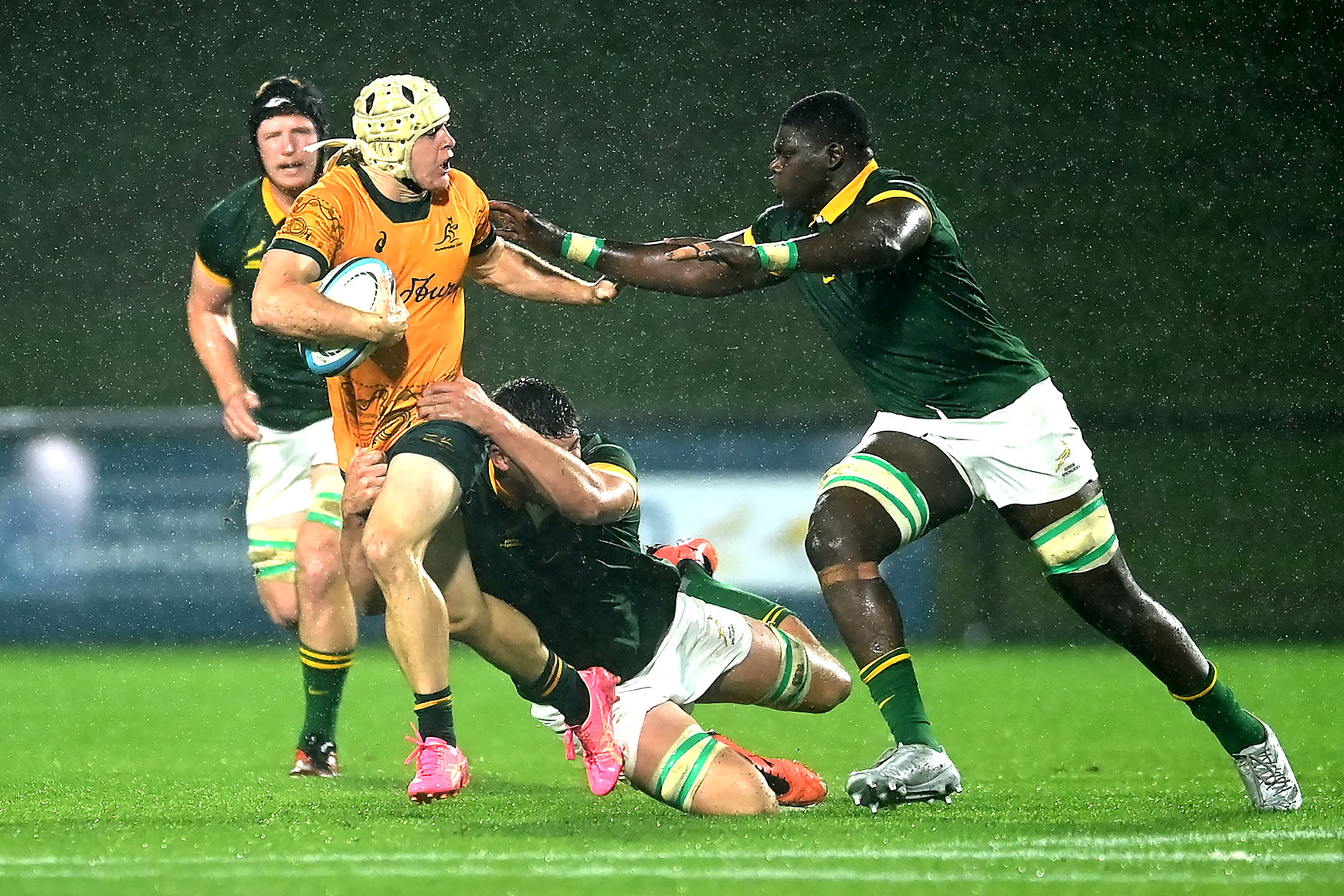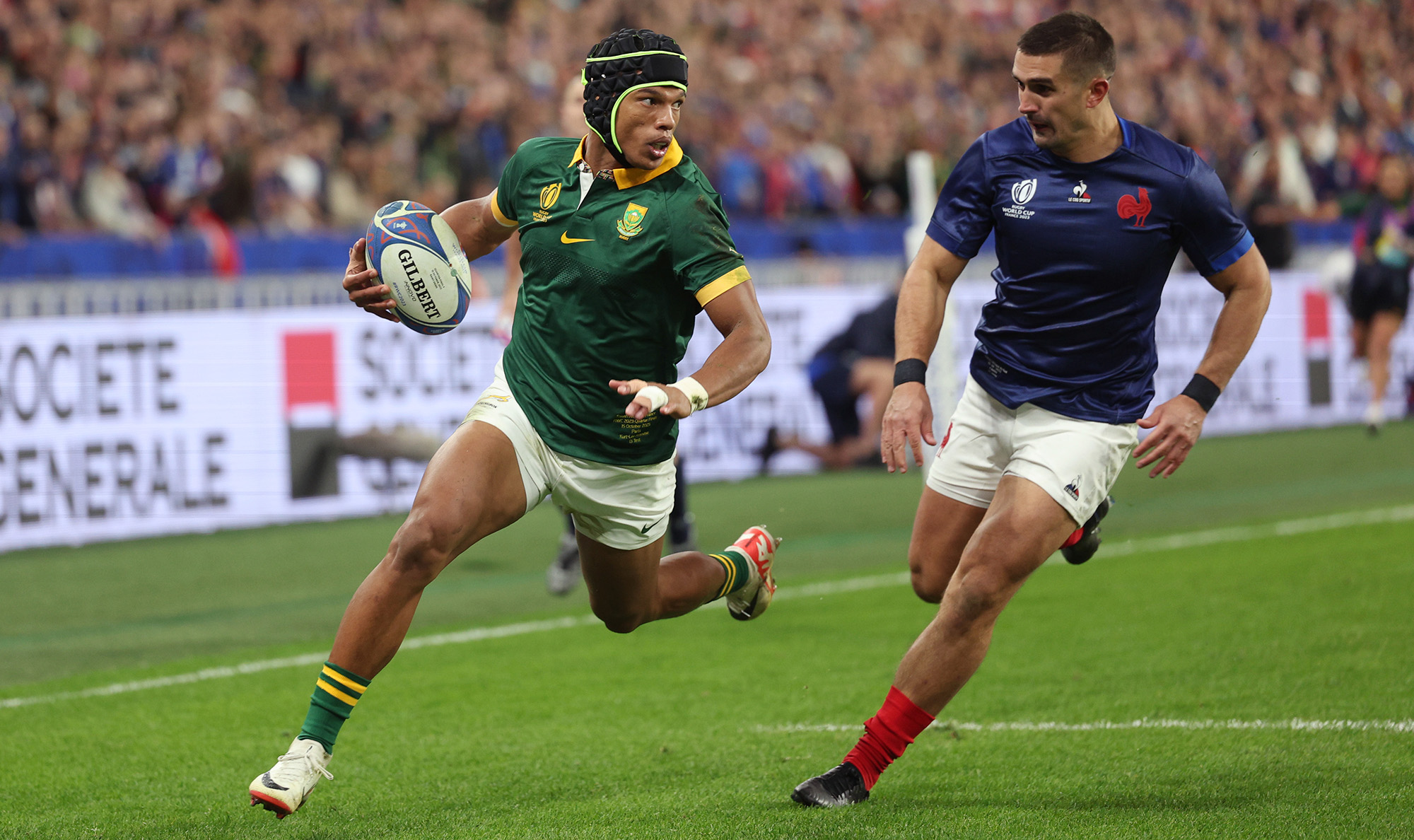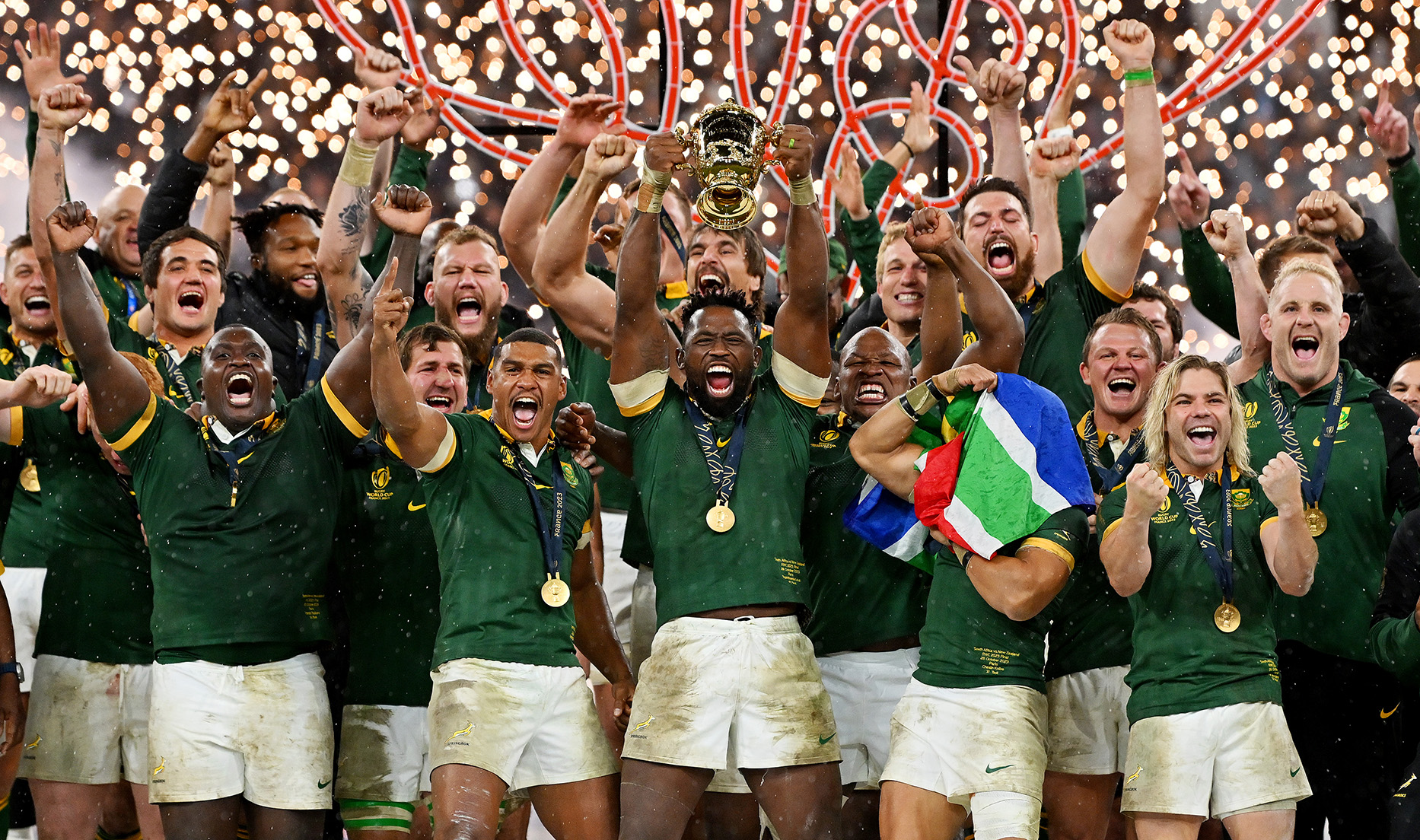A low-key email dropped in the early hours of Wednesday morning, confirming that South Africa would play host to the Under-20 Rugby Championship in Gqeberha this May.
It is understandably not very big news in sport. A regional age-group tournament is hardly something to splash on the front page of a news site.
It will be a good event though, featuring the best junior players from South Africa, New Zealand, Argentina and Australia playing three double headers over 10 days. Last year’s inaugural tournament in Gold Coast delivered some excellent rugby in tough conditions, with New Zealand winning.
 Angus Staniforth of Australia (left) is tackled by Junior Boks players in The Rugby Championship U20 Round Two match at Sunshine Coast Stadium, Australia, on 7 May 2024. (Photo: Albert Perez / Getty Images)
Angus Staniforth of Australia (left) is tackled by Junior Boks players in The Rugby Championship U20 Round Two match at Sunshine Coast Stadium, Australia, on 7 May 2024. (Photo: Albert Perez / Getty Images)
The Eastern Cape, despite many social and governance issues, offered to stump up the money to put on the event. The local government will probably be criticised for doing that because there is always another worthy cause needing money as well, but paying for an international event in a regional rugby stronghold is also valuable.
However, the major takeaway here is not the hosting of a high-quality event. Reading between the lines, there is an underlying message to South Africa and South African rugby fans.
And it’s this: hosting minor global rugby tournaments is about as good as it will get from now on.
By that, I mean, South Africa will probably not host the men’s Rugby World Cup – the pinnacle of the sport – again. And almost certainly not in the next two decades.
South Africans will have to grudgingly accept that when it comes to hosting rugby’s showpiece event, South Africa is considerably down the pecking order for several reasons, which we’ll get to shortly.
Painful memories
It’s unlikely that anyone in power at World Rugby feels at least a little ashamed of how France won the right to host Rugby World Cup 2023 despite South Africa being named the “preferred bidder” based on an independent assessment of the bids.
South Africa received an overall score of 78.97% after a lengthy and comprehensive evaluation by the independent technical committee. France scored 75.88% and Ireland came in with 72.25% on a selection of weighted criteria.
 Kurt-Lee Arendse of South Africa on his way to score his team’s first try against France in the 2023 World Cup quarterfinal. (Photo: Warren Little / Getty Images)
Kurt-Lee Arendse of South Africa on his way to score his team’s first try against France in the 2023 World Cup quarterfinal. (Photo: Warren Little / Getty Images)
It had been agreed by council members that the final vote for the hosts of RWC 2023 would be in line with the technical assessment scores.
Sensing France’s agitation at not being named the preferred bidder, the South African Rugby Union (Saru) issued a statement reminding the World Rugby council of the agreement to vote in line with the outcome of the independent assessment.
It fell on deaf ears as France mysteriously won a landslide in a vote that was supposed to rubber stamp the findings of the independent panel’s assessment.
Despite World Rugby’s best spin on the embarrassing outcome, a few years later it quietly published a revision to its RWC bidding process. It would instead be done on a “partnership” approach.
Chance gone
The reality was that losing out on hosting RWC 2023 represented South Africa’s last realistic chance of staging the showpiece.
The bid book Saru presented at the time was economical and made financial sense.
Infrastructure, largely built and financed by the successful Fifa 2010 World Cup, was still in place. There were nine world-class stadiums, airports had been upgraded and 13 years on from 2010, only minor infrastructural projects would have been required.
The South African government had also confirmed it would pay World Rugby’s guarantee of £120-million (at the time). That figure will have risen substantially.
South Africa’s bid, putting rugby history and tradition aside, made a strong business case for World Rugby.
 RG Snyman of South Africa is tackled by Romain Taofifenua and Dorian Aldegheri of France during the 2023 Rugby World Cup quarterfinal against France. (Photo: Chris Hyde / Getty Images)
RG Snyman of South Africa is tackled by Romain Taofifenua and Dorian Aldegheri of France during the 2023 Rugby World Cup quarterfinal against France. (Photo: Chris Hyde / Getty Images)
“SA will be the most profitable World Cup ever because we will be able to produce the tournament at 50% of the cost of any of the European bids‚” SA’s bid book, presented to the World Rugby Council in June 2017, stated.
“If you look at price parity‚ we are one-third of Europe. In other words‚ a tourist will be able to come to SA for three weeks for the equivalent cost of one week in Europe.
“There is no compromise in quality because our hotel rooms are the same standard and double the size.
“No infrastructure spend would be required and the economic impact study we have commissioned from Grant Thornton has a good news story to tell SA.
“We predict that hosting Rugby World Cup 2023 would have a R27.3-billion direct‚ indirect and induced economic impact on SA; R5.7bn would flow to low-income households; 38,600 temporary or permanent jobs would be sustained and there’d be an estimated R1.4-billion tax benefit to the government.”
We’ll never know if those figures were accurate.
Despite the Boks going on to win RWC 2023, and even if the projections and the bid book were overly optimistic, it still makes you want to cry that we missed such an opportunity.
It may be water under the bridge now, even though the events that led to France’s name being pulled from the envelope back in 2017, would be an interesting investigation for forensic auditors.
 Eben Etzebeth of South Africa is tackled by Anthony Jelonch of France while under pressure from Gregory Alldritt during the Rugby World Cup France 2023 quarterfinal at Stade de France in Paris on 15 October 2023. (Photo: Hannah Peters / Getty Images)
Eben Etzebeth of South Africa is tackled by Anthony Jelonch of France while under pressure from Gregory Alldritt during the Rugby World Cup France 2023 quarterfinal at Stade de France in Paris on 15 October 2023. (Photo: Hannah Peters / Getty Images)
In a perverse way, the Boks defeating France in the 2023 quarterfinals in Paris, by a single point in a dramatic game, was a small measure of atonement. As was the news last week that France had made a loss hosting the tournament.
A report by the French court of audit highlighted mismanagement of RWC 2023 that will lead to an estimated €29-million loss for French organisers. There will be no tears from South Africa.
But those are scraps of comfort. The country that has won the World Cup the most, and even New Zealand, the country with the second-most wins, are unlikely to host again.
RWC future
The 2027 tournament is going to Australia and 2031 was awarded to the US. There was no bidding process for those events, unlike in 2017, when Ireland and France were pitted against the South African bid.
Because the tournament will be staged in the US in 2031, where rugby has failed to gain traction, World Rugby will have almost no option but to bring it back to a guaranteed money spinner such as Britain in 2035. Spain has also been mentioned, which would be appealing.
World Cups in the United Kingdom and Europe are profitable and a “certainty” in terms of income for World Rugby. Although, as France 2023 has shown, maybe they are less profitable for the host country itself.
That leaves 2039 as the next realistic slot to host the showpiece, and that is likely to go to Japan again, or to the Middle East.
A joint bid from Qatar, Saudi Arabia and the United Arab Emirates (UAE) was recently touted.
It’s an inevitable next step for most sports, which are clambering over one another to earn some of the billions being pumped from the Middle East into sporting ventures.
Qatar is set to stage the Rugby Nations Championship in 2028, and it already sponsors big rugby clashes through its national airline. Clashes between the Boks and the All Blacks and the Boks and Wales at Twickenham have been sponsored by Qatar Airways.
The idea for a Middle East World Cup was published in The Times late last month with quotes from the head of Asia Rugby.
It was clearly a piece of public relations, probably designed to gauge interest and reaction to the idea. And although the initial information suggests the Middle East wants the RWC in 2035, it will probably also settle for 2039.
If the Middle East stages 2035 or 2039, it would push another Japanese RWC to 2043. It was profitable for World Rugby in 2019, and there is no reason it wouldn’t be again.
South Africa’s current economy and resources, and growth projections, don’t suggest this country will have money to stage another global showpiece.
The price tag will also have gone up by the early to mid-2040s as stadiums and other infrastructure built for 2010 will be approaching 35-40 years old.
So, South Africans might have to settle for “lesser” global tournaments while watching the Boks attempt to win the World Cup away from home every four years.
It’s not ideal, but it’s the reality. DM




 Eben Etzebeth of South Africa is tackled by Anthony Jelonch of France while under pressure from Gregory Alldritt during the Rugby World Cup France 2023 quarterfinal at Stade de France in Paris on 15 October 2023. (Photo: Hannah Peters / Getty Images)
Eben Etzebeth of South Africa is tackled by Anthony Jelonch of France while under pressure from Gregory Alldritt during the Rugby World Cup France 2023 quarterfinal at Stade de France in Paris on 15 October 2023. (Photo: Hannah Peters / Getty Images) 